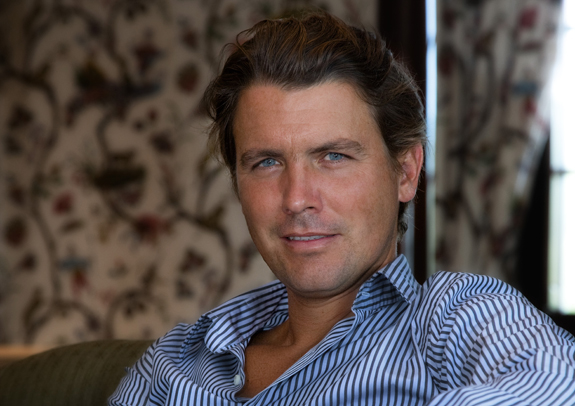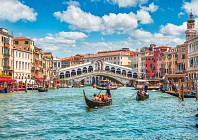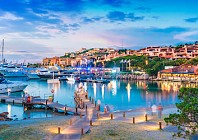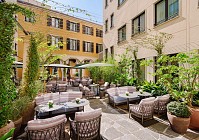SALVATORE Ferragamo is about as unassuming as could be, considering he is an heir to one of the most successful fashion labels in the world. Speaking to me via telephone from Il Borro, the 2,000-acre family estate he runs in the Arno Valley in Tuscany, Salvatore is warm, open and unhurried as we make small talk before our interview officially begins.
The weather in Tuscany is “lousy”, he tells me, but he doesn’t sound the slightest bit concerned. Perhaps it’s because he lives in one of the most picturesque corners of the world that his spirits are so high. Or maybe it’s because Il Borro has just been welcomed into the prestigious Relais & Châteaux – an exquisite collection of unique luxury hotels – and Salvatore has been named as the organisation’s Ambassador for 2013.
Of course it could also be the fact that he is in charge of a vineyard that produces some 150,000 bottles of wine from the 45 hectares of Merlot, Cabernet Sauvignon, Syrah and Petit Verdot grape varieties that are grown on the estate each year. Whatever the reason, Salvatore is in a fine mood and is enthusiastic to paint a picture of his treasured Il Borro before we go any further.
Salvatore’s father, Ferruccio Ferragamo, president and patriarch of the Salvatore Ferragamo fashion house and family respectively, acquired Il Borro from Duke Amedeo D’Aosta in 1993, after renting the estate from him for several years. The family spent a decade and a half restoring the estate and its buildings, which had fallen into disrepair over the ages.
The main manor house, a grand three-storey Tuscan villa, was bombed during the Second World War, and the buildings that comprise the Medieval Village, on the eponymous ‘borro’ or gorge, were crumbling after years of neglect.
The vineyards too were in dire need of attention before they could be replanted with the vines that now produce Il Borro’s wines: three reds, one white, a Vin Santo – Italian dessert wine – and a small amount of grappa. The estate also produces olive oil, sunflower oil and honey as part of Il Borro’s ‘agriturismo’ business, which is where it all began.
Introduced by the Italian government in the 1990s, agriturismo is an initiative that grants farmers the right to restore their homes and rent them out to tourists to experience the Tuscan produce and way of life. During the renovation process, a few of the buildings at Il Borro were restored for this purpose.
Over the last half-decade, the subsequent addition of more suites, a spa and fine dining restaurants, as well as a vast array of activities including horseback riding excursions, cooking classes and mountain biking, helped the estate evolve into the luxurious resort that it is today, culminating last year in Il Borro’s admission into Relais & Châteaux.
For the young Salvatore, working on the estate and “creating something from scratch” was always more appealing than joining the family business, a responsibility shouldered by his identical brother James, who is currently heading up the Women’s Leather Product department of Salvator Ferragamo S.p.A.
As well as his fondness for the Tuscan countryside and way of life, logistics were also a major factor in Salvatore’s decision not to go into the fashion business: “To join the family business we have very strict guidelines on the fashion side,” he explains.
“I had always wanted to start something from zero. To join the family business on the fashion side, there are only three positions available to about 25 members of the family, counting myself and my cousins. You have to have a university degree, you have to have an MBA and you need three years’ experience working for a company that is not related to the group, which is all to ensure that the top talent goes into the family business.”
He continues: “I did all of my studies and all of the pre-requirements, but when the time came, I said I wanted to do something different and have that feeling of starting from zero, which is always very rewarding.”
I suggest that in that sense, his start in the wine-making and hospitality business was similar to the beginnings of his grandfather, Salvatore Ferragamo, who became shoemaker to the greatest names in Hollywood soon after moving to the US in the 1920s.
But Salvatore is quick to dismiss the comparison in the most polite way possible: “Yes... but of course it is totally different,” he says.
“It was much easier to set up Il Borro. My grandfather started from very humble beginnings, whereas I have had a lot of support financially speaking. But yes, indeed, it has been very challenging.”
His unmistakably British diction comes from spending his formative years at an English boarding school from the age of 13, after growing up in Italy, the son of an Italian father and an English mother. He then moved to the US to study business, completing his MBA at New York University’s Stern School of Business.
Salvatore admits to falling in love with New York City: “I lived there for many years – very important years when you are growing up. I had many friends there and now it is my second home.”
I can’t imagine a more extreme contrast to the hectic pace of New York than a tranquil and indolent life spent tending to an estate in Tuscany. The irony is not lost on him: “I am very black and white,” he laughs. “I cannot do anything in between.”
Looking at images of the rolling hills of Tuscany, the endless rows of bright green vines and the charming 11th-Century houses that make up the Medieval Village at Il Borro, I can understand why he would choose the path of greater resistance over a life of catwalk shows and flashbulbs. But why, I ask him, did he choose not to use the family name when creating the wine or the estate?
“We discussed it but we agreed not to use the name. We don’t believe in cross-marketing in terms of using the Ferragamo name, which we use only in the fashion business,” he explains. “We want our guests to come to Tuscany and enjoy our wines and our accommodation because of the quality of those products, not because they have been endorsed by the name.”
Unsurprisingly, Il Borro attracts legions of loyal Ferragamo fans, some of whom come expecting to find suites fitted out from floor to ceiling in Ferragamo fabrics and products, as they might in some other fashion label-branded hotels, but this was never the plan for Il Borro.
“We wanted to keep the two businesses quite separate and concentrate on the style of Tuscany. We say come to Il Borro to get a taste of Tuscany – we have been very careful in our restoration not to turn it into Disneyland, but to give it a great feeling of authenticity.”
And they certainly seem to have succeeded. Understated rooms in earthy colours are found throughout the villas and suites. Long wooden tables stand on red-flagstone floors with open fireplaces in kitchens and living rooms that are typical of Tuscany; freestanding bathtubs are surrounded by bare-stone walls in the bathrooms, and floral or plain cream-coloured bedrooms are home to four-poster beds and classical wooden furniture under wooden-beamed ceilings. More modern touches are found in the public areas, like the VinCafe Restaurant and the Spa and Wellness Centre, whose magnificent infinity pool looks out over the estate and the Italian countryside.
The wine cellar is one of the oldest parts of the estate, and yet, in Tuscan terms, home to a very young business. The family name has helped to open doors in the highly-competitive wine business despite the fact that it is not used on the bottles, Salvatore says, but he maintains that the values that his grandfather instilled in the fashion business have been honoured in his approach to wine-making and hospitality.
“I think there are some similarities. The attention to the quality of the wine that we produce and our accommodation at Il Borro are true to Tuscany. They are not pretentious and they definitely fall into a kind of lifestyle which in many ways is similar to Ferragamo,” he says.
“Ferragamo tends to be less high-end fashion, like some other brands in the business. It is understated; more about the quality of our products. We are comfortable and elegant.”
So what does he think about other fashion brands that are currently branching out into the hospitality and food and beverage business?
“I think it dilutes the name. Yes, you have a short-term [positive] effect, but in the long run, you are diluting your name. You’re taking away, if you will – putting less importance on the fashion side by doing that.
And in the fashion business, and in Italy as a whole, there is nothing more important then preserving the integrity of a name.
When Ferruccio Ferragamo stepped down as chief executive in 2006 and the company opened up for foreign investment for the first time, there was a general agreement between the family and the new shareholders that the brand should remain in Italy and preserve the integrity of its roots – the roots that were planted by Salvatore Ferragamo in 1928.
At the company HQ in Florence, the Salvatore Ferragamo Museum gives visitors an insight into the life of the man and the heritage of the company he created, including a current exhibition about one of his most famous customers, Marilyn Monroe.
But perhaps the best legacy of the Italian shoemaker to the stars is his family; from those who are still working in the fashion business to his namesake, Salvatore Ferragamo Junior, who is now leading the family in a new direction – one that he believes upholds the heritage and values of his grandfather.
Does the weight of such a prestigious name ever feel like a burden, I ask: “No. It has created some embarrassing moments, when people thought I was my grandfather, but otherwise I am very lucky to have been part of an incredible family history,” Salvatore says.
“My grandfather started from zero and became known as the Hollywood shoemaker for the stars and from there he was able to take off and establish himself. So to carry his name for me is a great honour.” It seems the Ferragamo story is once again embarking on a new and exciting chapter.
Il Borro Resort, Spa and Winery
Tel: +39 055 977 053
www.ilborro.com














